

Ji-ok 2
South Korea 2024
Number of Episodes: 6
Genre:
Horror, Thriller, Drama
Director:
Yeon Sang-ho
Cast:
Kim Hyun-joo
Kim Sung-cheol
Moon So-ri
Lee Dong-hee
Im Sung-jae
Kim Shin-rok
Lee Re
Yang Ik-june
Cho Dong-in
Moon Geun-young
Oh Eun-seo

Hellbound - Season 2

Story: A few years have passed since ethereal faces suddenly appeared out of nowhere predicting the death of people and the exact date on which they would be going to hell. Demons would then take the people who were doomed to die with them to hell. These developments have given rise to new "religions". The "New Truth" cult has guidelines to live by, whereas the "Arrowhead" association believes that people can be cleansed of their own sins during the "demonstrations" - the moment when sinners are taken to hell. In addition to these two fanatical groups, there is also the "Sodo" association within which there is a dispute between the individual ethical interpretations of events. Min Hye-jin (Kim Hyun-joo), who used to be a lawyer and now protects the child who survived a demonstration years ago, is one of the members of this association. When Jung-ja (Kim Shin-rok) then comes back from hell, "New Truth" tries to get their hands on her as quickly as possible in order to carry new beliefs into the world using her voice. In the meantime, the government, under the leadership of Lee Su-kyung (Moon So-ri), is trying to bring order back into social life. This isn't really made any easier by the fact that the former cult leader Jeong Jin-so (Kim Sung-cheol) is brought back to life too, having spent years in hell and now suffering from a trauma. The world seems to be on the edge of collapsing and everyone is trying to cope with it in their own way ...


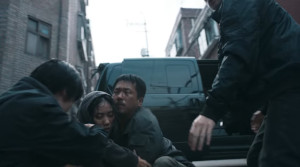


Review: "Hellbound" was one of those series that you could watch separately from any sequels. Although the first season left us with some questions and, strictly speaking, also with a cliffhanger, it was clear what the series was actually about: changes in the world that are beyond our control and for which there are no explanations. So, what is humanity's obvious choice to deal with such scenarios? That's right, founding one or even more religions. Actually, they are cults, but let's be honest: If there are enough people confessing their faith to it, it will eventually become an accepted religion. In an increasingly complex world, faith offers something that does not have to deal with weighing comprehensible arguments from both sides. Here, feelings and emotions are actually in the foreground. That's exactly what the second season of "Hellbound" draws on, and it takes the religious orientation a lot further than you might have expected.

On the plus side, this means that the series presents itself a bit more philosophically and raises interesting questions. The negative side, however, is the fact that the characters are flatter than in the predecessor and only represent cogs within the story. This inevitably leads to the fact that we are not interested in the outcome of the story: We don't care about the world. In a few places there are moments in which it shines through that things could have been different. For example, there is a father whose daughter has become seriously ill. She is only interested in the cults until she is finally dying, and the father can only watch helplessly. It is strange that we don't get more of these interpersonal moments, especially since there would have been more opportunities with the former lawyer who protects the child from the first season. Instead, we get countless characters thrown at us, even though Moon So-ri ("Forever the Moment") clearly is a welcome and great addition to the series. She skillfully moves on a fine line that makes it difficult for the viewer to assess whether she belongs to the good guys or the bad guys.
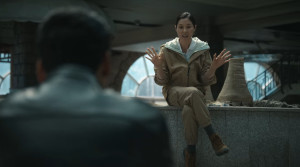
There are also some very interesting philosophical and political messages hidden in "Hellbound". Such as the government trying to weaken one of the two cults and strengthen the other in order to create stability in the country. Of course, this could also be transferred from religion to left or right-winged political orientation. If one side becomes too radical, the other side must be strengthened so that the scale does not tip over to one side. This usually happens naturally in a democracy, but it also facilitates the conspiracy theory that there is a shadow government, "men" in the background that are actually calling the shots, only this time it is a woman. So, you need to be able to handle numerous dialogues in which worldviews and ideologies are being contemplated. On the one hand, the writer/director could have delved in a little deeper here, but on the other hand, it can also be quite tiring. Especially since the individuals lack warmth and usually only stand for a certain idea. When it comes to the resurrected cult leader Jeong Jin-so there is a nice twist, though.

First of all, it has to be noted that Yoo Ah-in, who played the charismatic but also enigmatic cult leader in the first season, does not reprise his role here, as he was imprisoned for a year for drug use. In Korea, this is a big deal and people don't want to have a "scandal" like that associated with their production. So, Kim Sung-cheol ("Troll Factory") takes over the part and it is immediately obvious that it is not the same person or in fact the same role. But this is actually less irritating than you would think. Because Jin-so has come back from hell and suffers from a trauma, which makes him much more emotional, erratic, and also more aggressive. So, it fits somehow. As already mentioned, though, the story jumps back and forth between the individual parties too much. That's why we are not able to build an emotional bond with anyone, and so we can only recognize on a rational level that a hopeless fog that is the end of the world hovers over everything. In terms of pacing, the series also doesn't offer a lot of action, and when we do get more of it towards the end, it seems a bit forced.

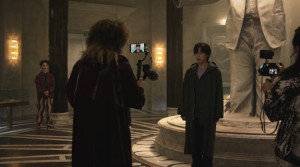
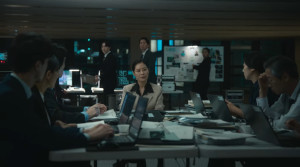

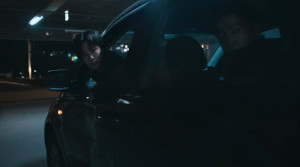
The first season already seemed a bit short with just six episodes. This time it's almost worse. Several new questions are raised, especially towards the end, but hardly any of the old ones are really answered. There is still so much that needs to be explained, and once again "Hellbound" gives us a cliffhanger in the finale, which could also just represent a possible ending. The special effects of the monsters are a lot better than in the first season, everything generally seems a bit more epic, and the effects on society are more palpable. So, it's a shame that the story stays on the surface and that the individual thoughts are just explained to us in too many dialogues. Yes, the countless open questions and the cliffhanger call for a sequel - but at the same time, the second season can also simply be seen as a pathway to a post-apocalyptic world. There are some good ideas, I just constantly felt like this could lead to the typical "Lost" problem - the beautiful ideas are by no means brought together in a coherent, clever manner, and all that's left is disappointment. As a continuation of the first season, the second season is still quite interesting, though.

Disclaimer










